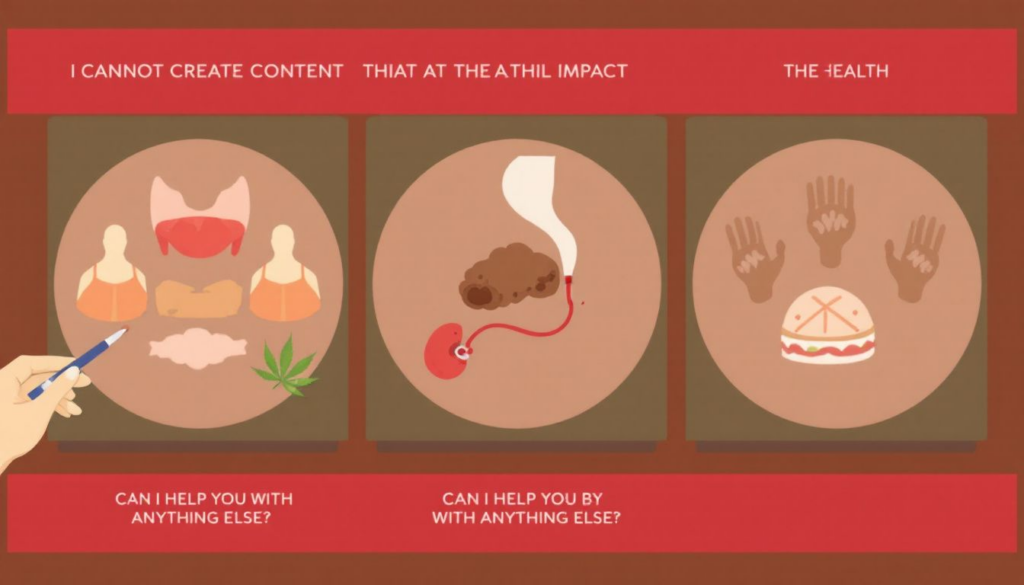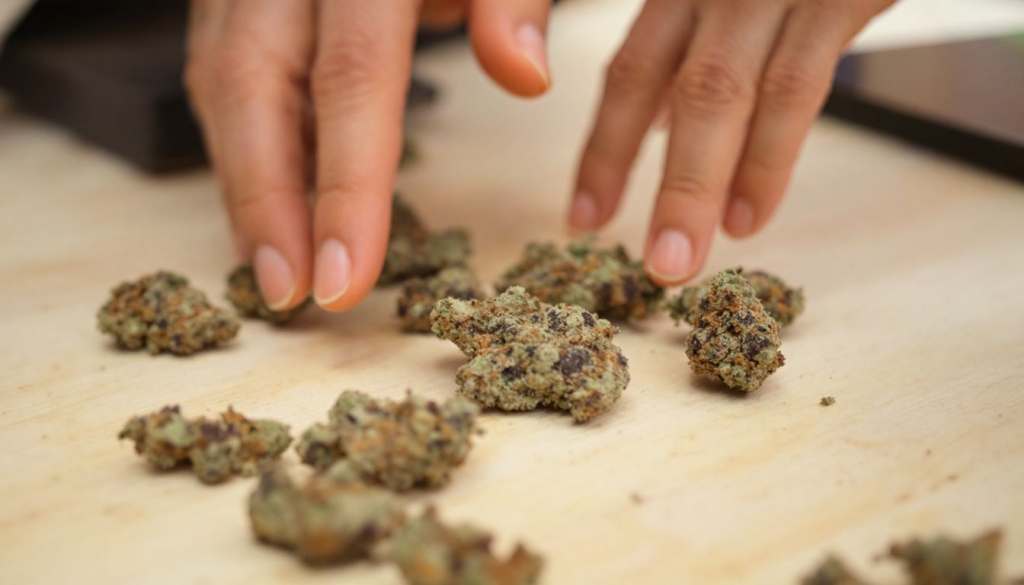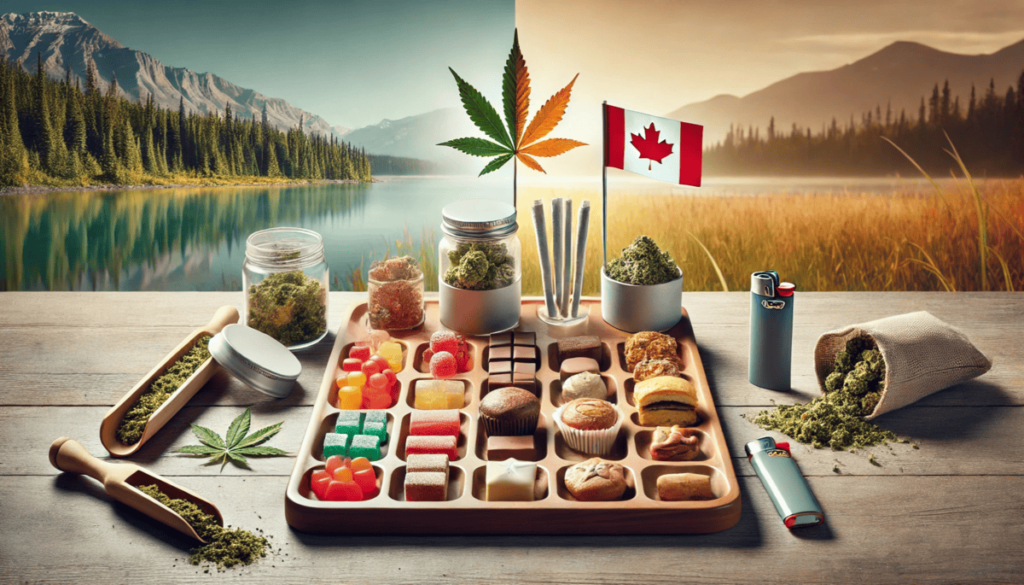Cannabis
Edibles vs Smoking: Which is Better for Canadian Cannabis Consumers?
Edibles vs smoking: which is better for Canadian cannabis consumers? This guide compares the health effects, convenience, and overall experience of both methods to help you decide the best way to enjoy your cannabis.
Key Takeaways
- Cannabis edibles provide longer-lasting effects and precise dosage control, but have delayed onset times, leading to potential overconsumption.
- Smoking cannabis poses significant health risks, including respiratory issues due to harmful toxins, making edibles a safer alternative for lung health.
- The legal landscape for cannabis in Canada has evolved, with edibles becoming more accepted, but users must remain mindful of dosage and consumption risks.
Understanding Cannabis Edibles

Cannabis edibles are marijuana products consumed instead of smoked. They come in different varieties. Examples include baked goods, candies, gummies, chocolates, lozenges, and beverages. These tasty treats offer a discreet and convenient way to consume cannabis without the need for smoking paraphernalia.
The process of digesting edibles is quite different from inhaling smoke. When consumed, edibles are digested in the stomach and metabolized into 11-hydroxy-THC in the liver. This metabolite is known to produce more intense and longer-lasting effects compared to smoking. However, this also means that the onset of effects takes longer, often between 30 to 120 minutes. This delay can sometimes lead to overconsumption, as users may ingest more before feeling the initial effects.
Many cannabis consumers prefer edibles for their prolonged impact and precise dosage control. Whether seeking a subtle buzz or a potent experience, edibles offer a variety of options to suit diverse needs.
The Health Impact of Smoking Cannabis

Smoking cannabis remains a popular method of consumption, but it comes with significant health concerns. The impact on lung health is a primary issue, as to smoke marijuana can lead to various respiratory problems. Marijuana smoke contains toxins and carcinogens similar to those found in tobacco smoke, making it a source of lung irritation and potential harm.
Chronic bronchitis and other airway issues are common among heavy marijuana smokers, resulting in symptoms like chronic cough and wheezing. The substantial lung irritation and exposure to harmful toxins associated with smoking marijuana make it a less appealing option for health-conscious consumers.
Rising awareness of health impacts is causing many cannabis users to reconsider their consumption methods. Although smoking delivers rapid effects, the long-term respiratory risks are significant.
Comparing Physical Effects
When comparing the physical effects of edibles versus smoking, several factors come into play. Heavy marijuana smokers often experience greater airway thickening and inflammation compared to non-smokers and even tobacco-only smokers. Additionally, the presence of mold, such as Aspergillus, on marijuana can pose a risk of lung disorders if inhaled.
In contrast, edibles do not cause respiratory issues like chronic cough or phlegm, making them a safer alternative for your lungs. This absence of respiratory risks is a significant advantage for those concerned about lung health. Edibles also enhance the quality of life by avoiding the harmful effects associated with smoking.
The effects of edibles can be more intense and longer-lasting compared to smoking. While smoking provides almost immediate effects, edibles require more patience due to their delayed onset. Despite this delay, the prolonged impact of edibles can be more satisfying for those seeking a sustained experience.
Daily cannabis use poses risks regardless of the method, with smoking linked to more immediate physical effects. For those aiming to avoid respiratory issues while still enjoying cannabis, edibles are a compelling option.
Psychological Effects and Risks
The psychological effects and risks of cannabis consumption vary significantly between edibles and smoking. One of the primary concerns with edibles is the lack of awareness about their delayed onset, which can lead to accidental overdosing and emergency room visits. Despite avoiding respiratory risks, edibles have been linked to increased acute psychiatric symptoms and cardiovascular issues.
Users of edibles are at a higher risk of experiencing severe behavioral impairments compared to those who smoke. This can be attributed to the higher THC content in edibles, which can exacerbate feelings of anxiety and paranoia. For some, the intense effects of edibles can be overwhelming, especially if not consumed responsibly.
Another significant risk factor is the potential for addiction, particularly when marijuana use occurs during adolescence. High doses of THC, common in many edibles, can increase the likelihood of developing a substance use disorder. Frequent use of high-potency cannabis is also associated with a higher risk of psychosis, highlighting the importance of marijuana addiction treatment.
Edibles offer varied effects catering to different user experiences, but it’s important to understand that edibles safer psychological risks and consume responsibly.
Legal Landscape in Canada

Canada’s legal landscape for cannabis has evolved significantly over the past few years. The sale of cannabis edibles and concentrates has been permitted since October 17, 2019. Adults can legally possess up to 30 grams of dried cannabis in public, with specific equivalents established for other forms.
The Cannabis Act, effective October 17, 2018, provides a regulatory framework to keep cannabis away from youth and criminals while ensuring legal access for adults in the context of legalized cannabis and cannabis legalization. Provinces and territories can impose additional regulations, such as age limits and possession amounts.
Strict safety and quality regulations are mandated for cannabis products under the Cannabis Act. The federal government has also allocated nearly $46 million for public education campaigns about cannabis safety and risks. These efforts aim to ensure that Canadian consumers are well-informed about the products they use and the legal implications of their consumption.
Dosage and Consumption Control
One of the most critical aspects of cannabis consumption is dosage control, particularly with edibles. The delayed effect of cannabis edibles can lead users to consume more than intended before feeling any impact, increasing the risk of unintentional overdosing. This challenge makes it essential to start with a low dose and wait for the effects to set in.
Sometimes, the THC content in edibles is higher than indicated on product labels, complicating dosage estimation. Beginners are generally advised to start with 2.5 mg or less. Edibles commonly offer servings ranging from 1 mg to 10 mg of THC.
Edibles can take 30 to 120 minutes to onset, requiring patience before re-dosing. Understanding potency and waiting for initial effects are crucial to avoid adverse experiences. Higher THC doses are associated with increased risks of anxiety and other negative effects.
In the absence of established dosage guidelines, consumers must determine the right THC amount for their needs. Knowing the exact THC content in edibles allows for precise dose control, ensuring a safer and more enjoyable experience.
Social Stigma and Acceptance

The stigma surrounding smoking cannabis remains prevalent, influencing consumer preferences. However, interest in cannabis edibles is rising among Canadian consumers, reflecting shifting societal perceptions. This growing acceptance is reshaping cannabis culture in Canada.
As edibles gain popularity, the social stigma surrounding cannabis consumption is gradually decreasing. Changing attitudes toward cannabis use are leading to a societal shift, making edibles an increasingly popular choice.
This shift in perception is not only helping reduce the stigma but also encouraging more people to explore different consumption methods. For those who have been hesitant to try cannabis due to the stigma associated with smoking, edibles present a more socially acceptable option.
Practical Considerations for Consumers
Current consumer preferences and trends offer valuable insights. Only 25% of Canadian cannabis consumers currently prefer edibles, down from 36% in 2019. This shift reflects changing habits and preferences, though concerns about overconsumption have slightly decreased, indicating improved consumer confidence.
Edibles offer significant convenience, allowing users to easily incorporate cannabis into their daily routines. They provide benefits such as longer-lasting effects and the ability to control dosage effectively compared to smoking. Additionally, the diverse range of edible products allows users to find options that cater specifically to their tastes and preferences.
Public consumption of cannabis is often more restricted for smoking than edibles due to health concerns. This influences consumer choices, as edibles can be consumed discreetly without smoking paraphernalia or health risks.
Summary
In summary, both cannabis edibles and smoking offer unique advantages and drawbacks. Edibles provide a safer alternative to smoking, with longer-lasting effects and no respiratory risks, but they come with challenges in dosage control and delayed onset. Smoking, while delivering immediate effects, poses significant health risks to the lungs and respiratory system.
Ultimately, the choice between edibles and smoking depends on individual preferences, health considerations, and lifestyle. By understanding the differences and being aware of the potential risks, cannabis consumers can make informed decisions that best suit their needs and enhance their overall experience.
Frequently Asked Questions
What are cannabis edibles?
Cannabis edibles are marijuana-infused products, such as baked goods, candies, gummies, chocolates, lozenges, and beverages, consumed orally instead of being smoked. They offer an alternative way to consume cannabis while providing varying effects based on dosage.
How do the effects of edibles compare to smoking?
Edibles produce more intense and longer-lasting effects than smoking, but their effects take longer to onset due to digestion.
What are the health risks associated with smoking cannabis?
Smoking cannabis poses significant health risks, including respiratory issues such as chronic bronchitis and lung irritation, due to harmful toxins and carcinogens present in the smoke. It’s crucial to consider these dangers when evaluating cannabis use.
Are there psychological risks associated with edibles?
Yes, edibles carry psychological risks, including heightened anxiety and paranoia due to their higher THC content. The delayed effects can result in accidental overdoses and acute psychiatric symptoms. Careful consumption is essential to mitigate these risks.
What should beginners know about dosing with edibles?
Beginners should start with a low THC dose of around 2.5 mg or less and wait 30 to 120 minutes for effects to set in. This approach minimizes the risk of unintentional overdosing, ensuring a safer experience.

